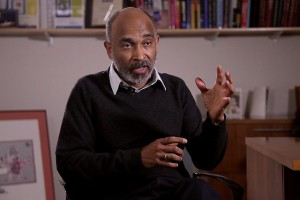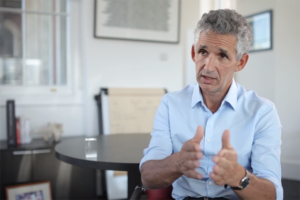Solid-State NMR of Biomolecules
Biophysicist Burkhard Bechinger on optical spectroscopy, magic angle spinning, and the orientation of molecule...
What are the similarities between evolution, phylogenesis and ontogenesis? How can we figure out specific mechanisms by which particular evolutionary transitions occurred? Associate Professor of Organismic & Evolutionary Biology at Harvard University Arkhat Abzhanov speaks on the most exciting question Evolutionary Developmental Biology (evo-devo) can answer.
Evolutionary development biology is an old and the new science at the same time. It began in the second half of the 19th century, during the time of Darwin, when he was active as well. When embryologists in Western Europe were studying developmental biology of many species’ organisms, and were trying to figure out, how they developed from the egg to adult. It became very apparent, that understanding of developmental biology would be actually quite important and relevant to understanding of evolution. Darwin himself was quite curious about developmental biology or embryology, that’s how it was called at that time.
It was the last 10 or 15 years when evo-devo became much more prominent. For about a century these two sciences, developmental genetics and evolutionary biology were following their own very distinct paths. Evolutionary biology focused on fossils, they focused on population genetics, they focused on how genetic variation changed within the population, and alike. Whereas developmental geneticists mostly focused on a few model organisms, such as drosophila, mouse, and a few others. They began to figure out the details of how organisms are put together, how information from genes is passed to the cells, how cells are organized into tissues, and how tissues are organized into organs, and how organs are built together.
There are many examples currently, where some rather precise mechanisms, genetic mechanisms, have been discovered, that explained important evolutionary transitions at both microlevel and macrolevel. Some of the first principles of developmental biology, or actually laydown in the 19th century, as I mentioned, during the time of Darwin, when he was working with his colleagues on his evolutionary theory, there were many very important developmental biologists, who were studying embryos of different species, and were trying to figure out the main principles, how they’re actually developed. One of these people is Karl von Baer. He was a Prussian scientist, and he formulated one of the first laws, that were called biogenetic laws. He discovered principles of how embryos are developing.

Biophysicist Burkhard Bechinger on optical spectroscopy, magic angle spinning, and the orientation of molecule...

Neuroscientist Emery Brown on the anesthetic state, the arousal network, and medical coma

Biologist Tim Spector on the different ways of assessing biological age, twin studies, and the microbiome